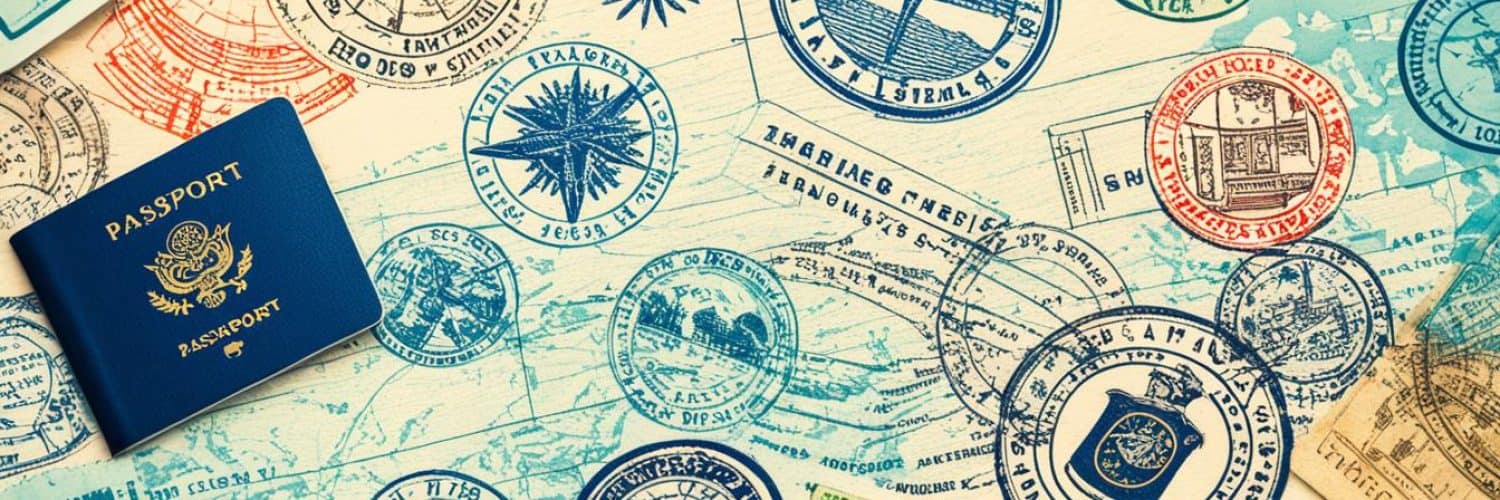Living abroad is an exciting adventure that opens up a world of possibilities. It’s a chance to immerse yourself in a new culture, embrace different perspectives, and discover the beauty of diversity. However, the term “expat” can feel limiting, failing to capture the depth and richness of the experience. That’s why we’ve curated a collection of alternative terms that will challenge your perception of what it means to live abroad.
Key Takeaways:
- Discover alternative terms that capture the essence of living abroad.
- Embracing unique synonyms for expat promotes a sense of belonging and fosters inclusion.
- Consider the impact of alternative terms on personal growth and cultural awareness.
- Explore how embracing a global perspective can contribute to a more interconnected world.
- Trigger your curiosity and challenge common beliefs about the expat experience.
The Importance of Finding Alternative Terms for Expat
Using alternative terms for “expat” can have a transformative impact on individuals living abroad. It not only helps them feel more connected to their new country but also allows them to avoid perpetuating stereotypes and assumptions. By embracing alternative terms, such as “foreign resident epithet,” “overseas dweller synonym,” and “non-native citizen synonym,” individuals can reframe their experience as a foreign resident, emphasizing their commitment to their new home and fostering a sense of belonging.
âEmbracing alternative terms highlights the diversity and richness of the global community, promoting inclusivity and eliminating the division between ‘locals’ and ‘expats.’ It encourages individuals to view themselves as integral members of their chosen countries, engaging fully in the culture and building meaningful connections without any preconceived notions or biases.â
By using these alternative terms, individuals can challenge conventional labels and foster a greater sense of unity among diverse groups of people. These terms emphasize the shared experience of living in a new country and help bridge the gap between non-native citizens and their local counterparts. It’s a small but significant step towards creating a more inclusive global society.
Alternative Terms for Expat
| Term | Description |
|---|---|
| Foreign Resident Epithet | Emphasizes the status of being a resident in a foreign country and highlights the integration and commitment to the new culture. |
| Overseas Dweller Synonym | Focuses on the experience of dwelling in a foreign land, capturing the sense of adventure and immersion in a new environment. |
| Non-Native Citizen Synonym | Highlights the idea of being a citizen of another country, acknowledging the unique journey and responsibilities that come with it. |
By embracing these alternative terms, individuals can align their self-perception with the reality of their global experiences. It allows for a more nuanced and respectful understanding of the diverse backgrounds and identities within the global community.
Embracing the Role of an Immigrant
Considering oneself as an immigrant rather than an expat can help individuals acknowledge the journey they have taken to live in a new country. The term immigrant synonym emphasizes the experience of moving to a new country and starting a new life. Additionally, the term emigrant equivalent highlights the idea of leaving one’s home country and seeking opportunities elsewhere. By embracing the role of an immigrant, individuals can better understand their own experience and show solidarity with others who have made similar journeys.
Emigrating to a new country is more than just relocating; it represents a significant personal and cultural transition. By adopting the immigrant label, individuals can honor their journey and the challenges they have overcome. This mindset encourages a sense of empathy and understanding towards others who are also navigating the complexities of living in a foreign land.
Recognizing the Emigrant Experience
While the term “expat” often carries connotations of privilege and affluence, the term “emigrant” captures a broader range of experiences. Emigrants leave their home country in search of better opportunities, seeking to improve their lives and those of their families. By embracing the emigrant equivalent, individuals can acknowledge the resilience and determination it takes to start afresh in a foreign land.
In the words of Maya Angelou: “You only are free when you realize you belong no place â you belong every place â no place at all.”
The Journey of Integration
Embracing the immigrant label fosters a sense of belonging and purpose. It encourages individuals to actively engage with the local community, learn the language, and understand the cultural nuances of their new home. By immersing themselves in the social fabric of the country, immigrants can create deeper connections, build friendships, and contribute positively to their adopted society.>
| Emigrant Equivalent | Immigrant Synonym |
|---|---|
| Leaving one’s home country | Moving to a new country |
| Seeking opportunities elsewhere | Starting a new life |
| Personal and cultural transition | Embracing a foreign culture |
| Determination to improve one’s life | Resilience in the face of challenges |
By embracing the role of an immigrant, individuals expand their understanding of the world and develop a greater appreciation for cultural diversity. This perspective not only enriches their own lives but also contributes to building a more inclusive and interconnected society. Whether it’s through sharing stories, celebrating traditions, or fostering cross-cultural dialogue, immigrants play a vital role in bridging divides and fostering understanding among people of different backgrounds.
Recognizing the Label of an Outsider
Living in a new country comes with its fair share of challenges and complexities. As outsiders, individuals may feel like they are on the fringes of society, not fully integrated into their new community. Recognizing and acknowledging this label can be an essential step in navigating cultural differences and working towards integration and understanding.
One way to address this is by exploring alternative terms that capture the experience of being an outsider. Instead of simply using the term “outsider,” individuals can consider using a synonym that emphasizes their unique position in a new country. By using an outsider synonym, we acknowledge the sense of being outside the mainstream and promote a deeper understanding of the challenges faced by individuals living abroad.
“Living as an outsider in a foreign land can be both exhilarating and challenging. Embracing this label allows us to connect with others who share a similar experience and build a sense of camaraderie.”
Similarly, the term “alien resident term” highlights the reality of being a resident in a foreign land. While the word “alien” may have connotations of being strange or foreign, it captures the essence of being an outsider in a new country. By embracing this label, individuals can recognize the uniqueness of their situation and foster a sense of empathy and understanding for the cultural differences they encounter.
Recognize, Embrace, and Connect
Recognizing the label of an outsider is the first step towards integration and meaningful connections. By embracing this identity, individuals can navigate the challenges of living in a new country with resilience and openness. It allows for a deeper understanding of the cultural differences, breaking down barriers, and fostering a sense of unity and belonging.
Being an outsider should not be seen as a negative label, but rather as an opportunity to bridge cultures and connect with others who have shared similar experiences. Embracing alternative terms and recognizing the label of an outsider can pave the way for personal growth, cultural understanding, and the formation of meaningful relationships.
The Benefits of Being a Global Citizen
Embracing a global lifestyle and considering oneself a global citizen can bring numerous benefits. As a global citizen, individuals have the opportunity to connect with people from different cultures, gain a broader perspective on global issues, and develop empathy and understanding for others. Being a global citizen allows individuals to expand their horizons, challenge their own assumptions, and contribute to a more inclusive and interconnected world.
Through meaningful interactions with people from different cultures, global citizens gain valuable insights, cultivate diverse perspectives, and break down barriers of prejudice and discrimination. They recognize that the world is interconnected, and their actions and choices can have a positive impact on global challenges such as climate change, poverty, and inequality.
“Global citizenship is not just about knowing global issues, it’s about taking action, making a difference, and embracing the richness of diversity.”
– Global Citizen Organization
As global citizens, individuals have the opportunity to make a meaningful contribution to the world. They can engage in volunteer work, advocate for social justice, and support sustainable development initiatives. By embracing global citizenship, individuals become active participants in shaping a better future for all.
Moreover, being a global citizen opens up a world of opportunities for personal and professional growth. Global citizens develop intercultural communication skills, which are highly valued in today’s globalized workforce. They are able to navigate diverse work environments, collaborate effectively with international teams, and adapt to new and challenging situations.
Benefits of Being a Global Citizen:
- Enhanced cultural awareness and understanding
- Expanded network of diverse connections
- Improved communication and collaboration skills
- Increased adaptability and resilience
- Opportunities for personal and professional growth
- Contribution to global causes and social issues
Embracing global citizenship is not just about the individual, but also about creating a more inclusive and interconnected world. By recognizing our shared humanity and embracing the diversity of cultures and perspectives, global citizens can work together to build a more peaceful and sustainable future.
| Benefits of Being a Global Citizen | Examples |
|---|---|
| Enhanced cultural awareness and understanding | Participating in cultural exchange programs |
| Expanded network of diverse connections | Building friendships with people from different countries |
| Improved communication and collaboration skills | Working on international projects |
| Increased adaptability and resilience | Adapting to new environments and overcoming challenges |
| Opportunities for personal and professional growth | Pursuing international career opportunities |
| Contribution to global causes and social issues | Volunteering for organizations focused on sustainable development |
The Diversity of Markets and Customers
In today’s global economy, leaders must navigate a landscape characterized by a diversity of markets and customers. Understanding and adapting to this diversity is crucial for long-term success and growth. Emerging markets, in particular, present significant opportunities for expansion, driven by a growing middle class with increasing purchasing power. These markets offer untapped potential for businesses to expand their customer base and drive revenue.
At the same time, customers themselves are becoming more diverse, with changing demographics and increased expectations for personalized products and services. As the world becomes more interconnected, individuals from various backgrounds and cultures interact on a global scale, bringing their unique preferences and demands. To thrive in this environment, businesses must not only recognize the diversity of their customer base but also tailor their offerings to meet the specific needs and preferences of different customer segments.
Changing Demographics and the Rise of Personalization
The demographic landscape of many countries is undergoing significant shifts. This includes changes in age, ethnicity, income levels, and consumer behaviors. As a result, businesses need to have a deep understanding of these demographic shifts to effectively target and serve diverse customer groups. By leveraging data analytics and consumer insights, companies can identify key trends and preferences that allow for targeted marketing and personalized experiences.
The key to success in the global marketplace is recognizing and embracing the diversity of markets and customers. Only by understanding the unique needs and preferences of different customer segments can businesses create products and services that resonate and drive growth. – [Name], CEO of a multinational corporation
Adapting to Emerging Markets
Emerging markets, with their expanding middle class and growing consumer spending power, present immense opportunities for businesses seeking to expand their global footprint. These markets offer considerable potential for revenue growth, given their large and often untapped customer bases. However, entering these markets successfully requires a deep understanding of the local culture, consumer behavior, and regulatory environment. Adapting products, services, and marketing strategies to these unique market conditions is essential for capturing the attention and loyalty of customers in these markets.
The Importance of Diversification
Diversification is key to navigating the diversity of markets and customers. By expanding into different markets and catering to various customer segments, businesses can spread out their risks and tap into new sources of revenue. Operating in multiple markets also provides opportunities for cross-cultural learning, innovation, and the sharing of best practices. Businesses that embrace diversity and adapt their strategies accordingly are better equipped to weather economic fluctuations and thrive in the dynamic global marketplace.
Summary
In the global economy, the diversity of markets and customers presents both challenges and opportunities for businesses. By recognizing and embracing this diversity, organizations can position themselves for long-term success. Understanding the unique needs and preferences of different customer segments, adapting to emerging markets, and embracing diversification are key strategies for thriving in today’s interconnected and diverse business landscape.
The Importance of Diversity of Ideas and Talent
In a rapidly changing world, diversity of ideas and talent is crucial for innovation and adaptability. Organizations that embrace the diversity of ideas and talent are better equipped to navigate the challenges presented by digital technology, hyper-connectivity, and deregulation, which are disrupting traditional business models.
Embracing diversity leads to rapid innovation, as different perspectives and experiences contribute to a richer problem-solving process. When individuals with diverse backgrounds collaborate, they bring unique viewpoints and approaches to the table.
“Diversity brings together different ways of thinking and encourages creative solutions to complex problems.”
Moreover, shifts in age profiles, education, and migration flows have a profound impact on employee populations. As the workforce becomes increasingly diverse, organizations that prioritize diversity and equal opportunity are more likely to attract and retain top talent.
By embracing a diverse range of ideas and talent, organizations can foster an inclusive and dynamic workplace culture that values and respects the contributions of all individuals. This results in higher employee engagement, improved creativity, and enhanced problem-solving capabilities.
The Benefits of Diversity of Ideas and Talent:
- Promotes innovation and problem-solving
- Enhances creativity and critical thinking
- Expands perspectives and encourages open-mindedness
- Drives employee engagement and retention
- Improves decision-making and risk management
By embracing diversity of ideas and talent, organizations can tap into the full potential of their workforce and gain a competitive edge in the evolving global landscape.

The Shift Towards Inclusive Leadership
Inclusivity is a vital trait for leaders in today’s diverse and global environment. Being an inclusive leader means fostering a culture of belonging, where every individual feels valued and respected for their unique contributions. Inclusive leaders possess six key traits that characterize their inclusive mindset and behavior:
- Humility: Inclusive leaders recognize that they don’t have all the answers and are open to different perspectives. They actively seek feedback and value the input of others.
- Curiosity: Inclusive leaders have a genuine interest in learning about different cultures, backgrounds, and experiences. They actively seek out opportunities to expand their knowledge and understanding.
- Cultural Intelligence: Inclusive leaders have a high level of cultural intelligence, enabling them to navigate cultural differences with sensitivity and inclusivity. They adapt their leadership style to meet the needs of diverse team members.
- Character: Inclusive leaders lead with integrity and demonstrate ethical behavior. They prioritize fairness, transparency, and treating others with dignity and respect.
- Collaboration: Inclusive leaders actively promote collaboration and create opportunities for diverse team members to contribute. They value diverse perspectives and ensure that everyone’s voice is heard.
- Commitment: Inclusive leaders are committed to creating a diverse and inclusive work environment. They champion diversity initiatives, set clear goals for inclusivity, and hold themselves and others accountable.
By developing and embodying these inclusive leadership traits, leaders can effectively navigate cultural differences, foster diverse and inclusive teams, and drive innovation and success in their organizations.
Inclusive leaders create an environment where everyone can thrive and contribute their best. They harness the power of diversity to drive innovation, creativity, and better decision-making.
Embracing inclusive leadership benefits both the individual leader and the organization as a whole. It sets the foundation for a positive, inclusive culture that attracts top talent, enhances employee engagement and retention, and enables organizations to better serve diverse customer bases.
| Benefits | Description |
|---|---|
| Innovative Thinking | Inclusive leaders foster an environment that encourages diverse perspectives and ideas, leading to innovative solutions and approaches. |
| Employee Engagement | An inclusive workplace promotes employee engagement, job satisfaction, and a sense of belonging, resulting in higher productivity and performance. |
| Talent Acquisition and Retention | Organizations with inclusive leaders attract and retain top talent by offering a supportive and equitable work environment. |
| Cross-Cultural Collaboration | Inclusive leaders excel in cross-cultural collaboration, fostering teamwork and cooperation among diverse team members. |
| Improved Decision Making | Inclusive leaders leverage diverse perspectives and experiences to make more informed and well-rounded decisions. |
Inclusive leadership is not just a buzzword; it is a fundamental shift towards better leadership practices in a diverse and globalized world. By embracing and embodying the traits of inclusive leaders, organizations can create a culture of inclusivity that drives success and growth.
The Impact of Cultural Awareness on Travel
Cultural awareness plays a crucial role in enhancing travel experiences. When travelers embrace local customs, traditions, and behaviors, their interactions become more meaningful and authentic. By immersing themselves in the local culture, individuals can truly connect with the destination and its people, creating lasting memories and forging deeper connections.
Having cultural awareness also helps travelers navigate unfamiliar situations. Understanding the local customs and etiquette allows individuals to interact respectfully, avoiding unintentional offense or misunderstanding. By showing respect for the local culture, travelers can build positive relationships with the local community, fostering a sense of mutual understanding and appreciation.
By enhancing cultural awareness, individuals can make the most out of their travel experiences and contribute to responsible and respectful tourism.
Responsible tourism involves supporting local businesses, respecting the environment, and preserving cultural heritage. Cultural awareness enables travelers to engage with local communities in a way that positively impacts their lives, contributing to sustainable development and the protection of cultural diversity.
The Benefits of Cultural Awareness in Travel:
- Meaningful interactions with locals
- Deeper understanding of local culture and traditions
- Respectful and responsible travel practices
- Enhanced personal growth and self-awareness
- Authentic and memorable travel experiences
| Cultural Awareness: | Travel Experience: |
|---|---|
| Embrace local customs and traditions | Experience the destination like a local |
| Show respect for the local culture | Develop meaningful connections with locals |
| Avoid unintentional offense or misunderstanding | Enhance cross-cultural communication |
| Support local businesses and communities | Contribute to responsible and sustainable tourism |
By embracing cultural awareness in travel, individuals can unlock the full potential of their journeys. Whether it’s appreciating local traditions, engaging in meaningful conversations, or immersing oneself in the local way of life, cultural awareness enriches travel experiences and fosters a deeper connection with the world.
The Role of Cultural Awareness in Personal Growth
Cultivating cultural awareness fosters personal growth and development. By learning about different cultures, individuals broaden their horizons, challenge their own perspectives, and develop empathy, open-mindedness, adaptability, and problem-solving skills. Cultural awareness enables individuals to connect with others on a deeper level, understand diverse perspectives, and contribute to a more inclusive and harmonious society.
Understanding and appreciating different cultures expands our horizons and encourages personal growth. It allows us to step outside our comfort zones, challenge our own beliefs, and develop a greater appreciation for diversity. By cultivating cultural awareness, we become more empathetic and open-minded, fostering a deeper understanding of others.
Empathy is a core aspect of cultural awareness, as it allows us to put ourselves in someone else’s shoes and understand their experiences, emotions, and perspectives. By embracing cultural awareness, we develop the ability to connect with others, regardless of their background or differences. This empathy leads to stronger relationships and a greater sense of community.
Open-mindedness is another key attribute that cultural awareness nurtures. It encourages us to approach new ideas, beliefs, and practices with curiosity rather than judgment. By embracing open-mindedness, we can challenge our own biases and expand our perspectives, leading to personal growth and intellectual enrichment.
Cultural awareness also promotes adaptability and problem-solving skills. By understanding and appreciating different cultures, we become more flexible in navigating diverse situations and finding innovative solutions to challenges. This adaptability not only benefits us personally but also makes us valuable contributors to diverse teams and organizations.
“Cultural awareness is the key to personal growth and a more inclusive society. By embracing diverse perspectives, we can foster empathy, open-mindedness, and adaptability, ultimately leading to personal and societal development.” – Dr. Jane Wilson, Cultural Anthropologist
By embracing cultural awareness, we can unlock personal growth and contribute to a more inclusive and harmonious society. As we learn about different cultures and embrace diversity, we expand our horizons, challenge our own beliefs, and develop essential skills for navigating a globalized world. Through empathy, open-mindedness, and adaptability, cultural awareness shapes us into well-rounded individuals who can connect with others and contribute positively to the world around us.
Benefits of Cultural Awareness in Personal Growth:
| Benefits | Explanation |
|---|---|
| Enhanced empathy | Cultural awareness fosters empathy by enabling us to understand and appreciate diverse perspectives and experiences. |
| Expanded horizons | Learning about different cultures broadens our horizons and challenges our own beliefs, leading to personal growth. |
| Open-mindedness | Cultural awareness promotes open-mindedness, allowing us to approach new ideas and beliefs with curiosity rather than judgment. |
| Adaptability | Understanding diverse cultures enhances our adaptability and problem-solving skills in a globalized world. |

Cultural Awareness in the Workplace
Cultural awareness is a valuable asset in today’s workplace. Employers highly value candidates who possess experience living and working in different cultures, as it reflects their adaptability, intercultural communication skills, and ability to effectively collaborate with diverse teams.
Awareness and understanding of different cultures enhance communication skills, enabling individuals to navigate cultural differences and foster effective communication with colleagues, clients, and stakeholders from various backgrounds. Such skills promote a harmonious work environment and facilitate successful collaboration on projects and initiatives.
“Cultural awareness is not just about recognizing the differences; it’s about valuing them, understanding their impact, and leveraging them to achieve common goals.”
By embracing cultural awareness in the workplace, individuals can enhance their employability and open doors to new opportunities. Employers seek professionals who can contribute to diverse teams, bring unique perspectives, and navigate the complexities of a globalized world.
Cultural awareness also fosters sensitivity towards cultural nuances and norms, avoiding misunderstandings and conflicts. It promotes inclusivity, diversity, and equality in the workplace, creating an environment where all employees feel respected and valued.
Developing cultural awareness is a continuous process that requires active engagement, self-reflection, and a genuine interest in learning about different cultures. Integrating intercultural experiences, such as participation in international projects or working with multicultural teams, can further enhance cultural awareness and professional growth.
Key Benefits of Cultural Awareness in the Workplace:
- Facilitation of effective communication and collaboration
- Enhancement of problem-solving and decision-making abilities
- Improvement of interpersonal relationships and teamwork
- Development of a global mindset and adaptability
- Expansion of professional networks and opportunities
Employers recognize the value of employees who possess cultural awareness, as it contributes to overall organizational success in an interconnected and diverse global marketplace.
| Benefits of Cultural Awareness in the Workplace | Employer Perspective | Employee Perspective |
|---|---|---|
| Effective communication and collaboration | Facilitates seamless teamwork and innovation | Enhances career growth and employability |
| Enhanced problem-solving and decision-making abilities | Drives creative solutions and strategic thinking | Improves professional skills and adaptability |
| Improved interpersonal relationships and teamwork | Cultivates a positive and inclusive work environment | Promotes personal growth and relationship-building |
| Development of a global mindset and adaptability | Expands business opportunities and global reach | Explores new cultures and broadens horizons |
| Expansion of professional networks and opportunities | Stimulates cross-cultural collaboration and partnerships | Strengthens career prospects and international mobility |
The Benefits of Cultural Awareness for Study Abroad and International Programs
Study abroad and international programs offer students an incredible opportunity to immerse themselves in new cultures, broaden their horizons, and gain a deeper understanding of the world. One key aspect that greatly enhances this experience is developing cultural awareness. By actively engaging with the local culture and community, students can navigate unfamiliar environments with confidence, build meaningful relationships with locals, and enhance their intercultural communication skills.
Cultural awareness allows students to go beyond being mere observers and become active participants in their study abroad experience. By understanding the values, customs, and traditions of their host country, students can better connect with locals, participate in cultural activities, and truly embrace the uniqueness of the culture they are in.
| Benefits of Cultural Awareness for Study Abroad and International Programs: |
|---|
| 1. Enhanced intercultural communication skills |
| 2. Deeper immersion in the host culture |
| 3. Increased cultural competency |
| 4. Building meaningful relationships with locals |
| 5. Expanding global perspectives and understanding |
Intercultural communication skills are crucial in today’s interconnected world. By developing these skills, students can effectively navigate cross-cultural interactions, overcome language barriers, and foster understanding and respect. Cultural awareness also allows students to adapt to different social norms and expectations, enabling them to communicate more effectively and avoid unintentionally causing offense.
“Cultural awareness enriches study abroad experiences, enabling students to engage more deeply with the culture and language of their host country. It broadens their perspectives, fosters personal growth, and equips them with intercultural communication skills that are essential for success in an increasingly globalized world.” – Source Name
By actively embracing cultural awareness, students can truly make the most of their study abroad and international programs. They have the opportunity to grow personally, expand their global perspectives, and become more empathetic and open-minded individuals. Furthermore, the benefits of developing cultural awareness extend far beyond their time abroad, as it equips students with valuable skills and experiences that can positively impact their future academic and professional endeavors.
As students embark on their study abroad journeys, embracing cultural awareness will not only enhance their personal growth but will also contribute to a more inclusive and interconnected world, where individuals from different cultures and backgrounds can come together with empathy, understanding, and a shared desire for positive change.
The Long-Term Impact of Cultural Awareness
Cultural awareness goes beyond the immediate benefits of embracing diversity. It has a profound and long-lasting impact on individuals and society as a whole. By actively cultivating cultural awareness, individuals become responsible global citizens who can effectively communicate and engage with people from diverse backgrounds. This understanding and acceptance of cultural differences contribute to a more inclusive and harmonious world, where empathy, understanding, and respect are valued.
“Cultural awareness helps break down barriers and fosters meaningful connections that lead to positive social change.”
When individuals take the time to understand and appreciate different cultures, they develop a broader perspective and a deep appreciation for the richness and uniqueness of each society. They begin to see the world through a more empathetic lens, recognizing the commonalities that unite us all as human beings. This shift in mindset and attitude has far-reaching implications for personal growth, relationships, and the global community.

Embracing Diversity for a Positive Impact
Cultural awareness helps break down stereotypes and preconceived notions by providing individuals with a deeper understanding of different traditions, customs, and perspectives. This knowledge allows for more meaningful connections and collaborations, leading to positive social change. By recognizing and appreciating diversity, responsible global citizens actively contribute to creating a more equitable and inclusive society.
The Power of Effective Communication
One of the greatest benefits of cultural awareness is the improvement in communication skills. When individuals have a greater understanding of cultural nuances and sensitivities, they are better equipped to communicate effectively with people from diverse backgrounds. This leads to stronger relationships, increased cooperation, and the ability to navigate cultural differences with respect and empathy.
Building Bridges Across Borders
Cultural awareness also plays a pivotal role in bridging divides and promoting global understanding. It encourages individuals to step outside their comfort zones, engage with different cultures, and challenge their own perspectives. By actively seeking out diverse experiences and embracing cultural differences, responsible global citizens foster empathy, promote dialogue, and nurture a more peaceful and interconnected world.
“Cultural awareness allows us to appreciate the beauty and richness found in the tapestry of human existence.”
In a world that is increasingly interconnected, cultural awareness is not just a desirable trait, but a necessary one. It empowers individuals to navigate the complexities of our globalized society and make a positive impact on the world. By embracing diversity, understanding different cultures, and promoting inclusivity, responsible global citizens play a vital role in creating a world where everyone can thrive and contribute their unique perspectives and talents.
Embracing the Uniqueness and Enrichment of Different Cultures
Cultural awareness encourages individuals to embrace the uniqueness and diversity of different cultures. Rather than seeing cultural differences as barriers, they are seen as enrichment opportunities. Different perspectives, experiences, and beliefs contribute to a richer culture and society. By valuing and celebrating diversity, individuals can create a more inclusive and welcoming environment where everyone feels a sense of belonging and appreciation for their unique contributions.
“In diversity there is beauty and strength.”
To fully appreciate the enrichment that different cultures offer, it is important to acknowledge and respect the diverse perspectives they bring. Each culture carries its own set of values, traditions, and ways of life, which provide valuable insights and broaden our understanding of the world. By embracing these unique perspectives, we gain a deeper appreciation for the richness and complexity of human experiences.
Benefits of Embracing Diversity:
- Increased creativity and innovation
- Enhanced problem-solving abilities
- Expanded cultural knowledge and awareness
- Promotion of tolerance and understanding
- Development of global communication skills
- Enriched personal and professional networks
By embracing the uniqueness and enrichment of different cultures, we not only promote a more inclusive society but also create opportunities for personal growth and mutual understanding. Through cultural exchange, we can bridge divides and foster meaningful connections that transcend borders.
| Benefits of Embracing Diversity | Description |
|---|---|
| Increased creativity and innovation | A diverse range of perspectives sparks new ideas and breeds innovation within organizations and communities. |
| Enhanced problem-solving abilities | By considering multiple viewpoints, diverse teams are more effective at solving complex problems. |
| Expanded cultural knowledge and awareness | Engaging with different cultures broadens our understanding of the world and promotes cultural appreciation and respect. |
| Promotion of tolerance and understanding | By embracing diversity, we foster an environment of acceptance and understanding, reducing prejudice and discrimination. |
| Development of global communication skills | Interacting with individuals from diverse backgrounds hones our ability to communicate and collaborate on a global scale. |
| Enriched personal and professional networks | Embracing diversity expands our networks, creating connections that can lead to personal and professional growth opportunities. |
Conclusion
Embracing alternative terms for “expat” and developing cultural awareness have numerous benefits, both personally and professionally. By exploring synonymous expressions for expat, individuals can better capture the richness of their global experiences. Using these terms promotes inclusivity and a sense of belonging in their new countries.
Furthermore, adopting the role of an immigrant or recognizing the label of an outsider allows individuals to acknowledge their own journey and better navigate the challenges of living in a foreign land. This mindset fosters integration, cultural understanding, and a stronger connection with local communities.
In addition, cultural awareness is essential for personal growth, travel experiences, and success in the workplace. It broadens horizons, nurtures empathy, and enhances communication skills, enabling individuals to connect with diverse cultures on a deeper level. Cultural awareness also contributes to a more inclusive and harmonious society, where understanding and respect for different perspectives are valued.
By embracing the richness of different cultures and promoting inclusivity, individuals can truly embrace a global life. Developing cultural awareness allows us to make a positive impact on the world, breaking down barriers and fostering meaningful connections that lead to a more interconnected and harmonious global community.
FAQ
What is an alternative term for an expat?
Some alternative terms for an expat include foreign resident epithet, overseas dweller synonym, and non-native citizen synonym.
Why should I consider using alternative terms for an expat?
Using alternative terms promotes inclusivity, highlights the experience of living in a new country, and avoids perpetuating stereotypes and assumptions.
What is the difference between an expat and an immigrant?
An immigrant emphasizes the experience of moving to a new country and starting a new life, while an expat typically refers to someone living temporarily in another country.
How can recognizing the label of an outsider help in living abroad?
Recognizing the label of an outsider can help individuals navigate cultural differences, work towards integration, and develop empathy and understanding for the new culture.
What are the benefits of embracing a global lifestyle?
Embracing a global lifestyle allows individuals to connect with people from different cultures, gain a broader perspective, and contribute to a more inclusive and interconnected world.
Why is diversity important in markets and customers?
Diversity of markets and customers presents growth opportunities and allows businesses to cater to the unique needs and preferences of diverse customer segments.
How does diversity of ideas and talent impact business success?
Diversity of ideas and talent fosters innovation, adaptability, and helps organizations better understand and serve diverse customer bases.
What are the traits of inclusive leaders?
Inclusive leaders possess humility, curiosity, cultural intelligence, character, collaboration, and commitment, which allows them to effectively navigate cultural differences and drive innovation.
How does cultural awareness impact travel experiences?
Cultural awareness enhances travel experiences by promoting meaningful interactions, helping navigate unfamiliar situations, and fostering better relationships with local communities.
Why is cultural awareness important for personal growth?
Cultural awareness broadens horizons, challenges perspectives, develops empathy and problem-solving skills, and helps individuals connect with others on a deeper level.
How does cultural awareness benefit the workplace?
Cultural awareness improves communication, facilitates effective collaboration, and allows individuals to work more effectively with colleagues, clients, and stakeholders from different backgrounds.
Why is cultural awareness important for students in study abroad programs?
Cultural awareness helps students navigate unfamiliar environments, engage more deeply with the host culture, and develop intercultural communication skills.
What is the long-term impact of cultural awareness?
Culturally aware individuals become responsible global citizens who can effectively engage with diverse cultures, contributing to a more inclusive and harmonious world.
How can embracing the uniqueness of different cultures benefit society?
Embracing the uniqueness of different cultures creates a more inclusive and welcoming environment, where diversity is celebrated, and everyone feels a sense of belonging and appreciation.


















Add comment